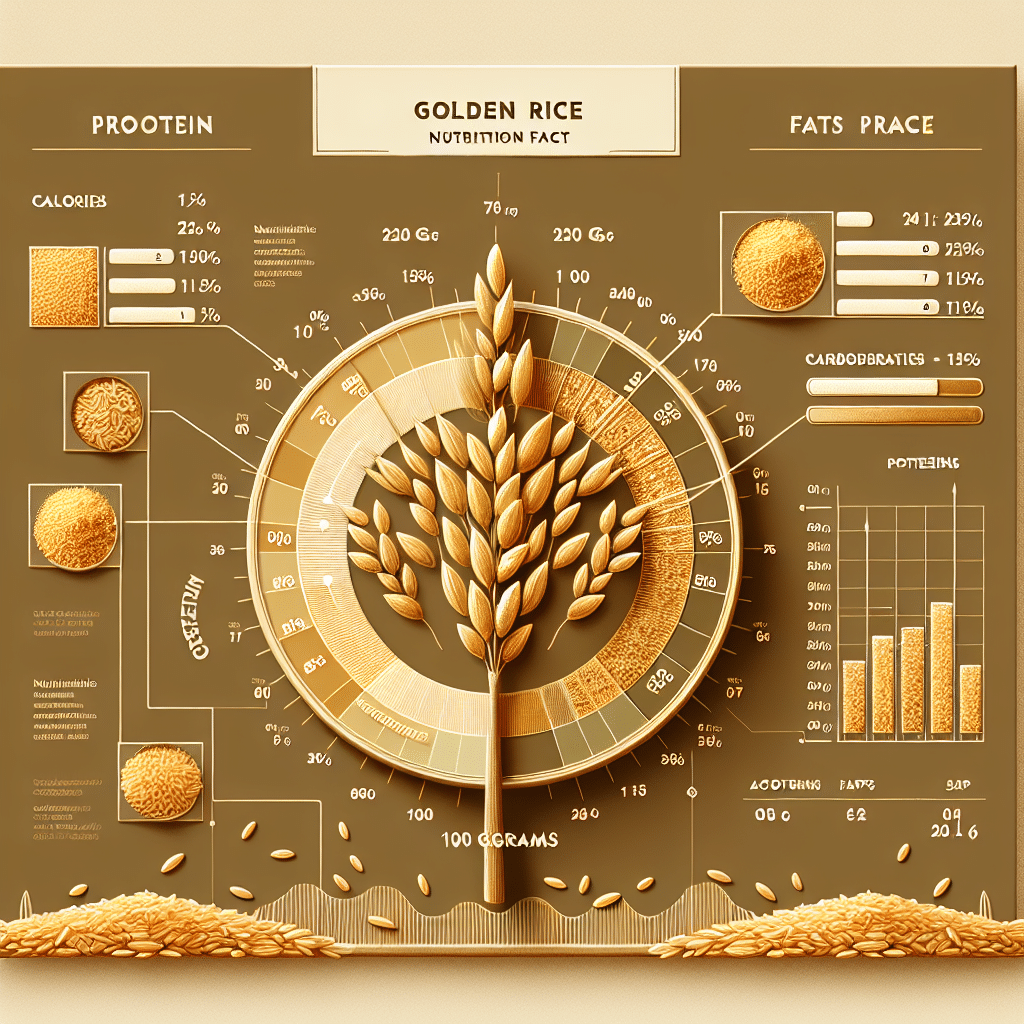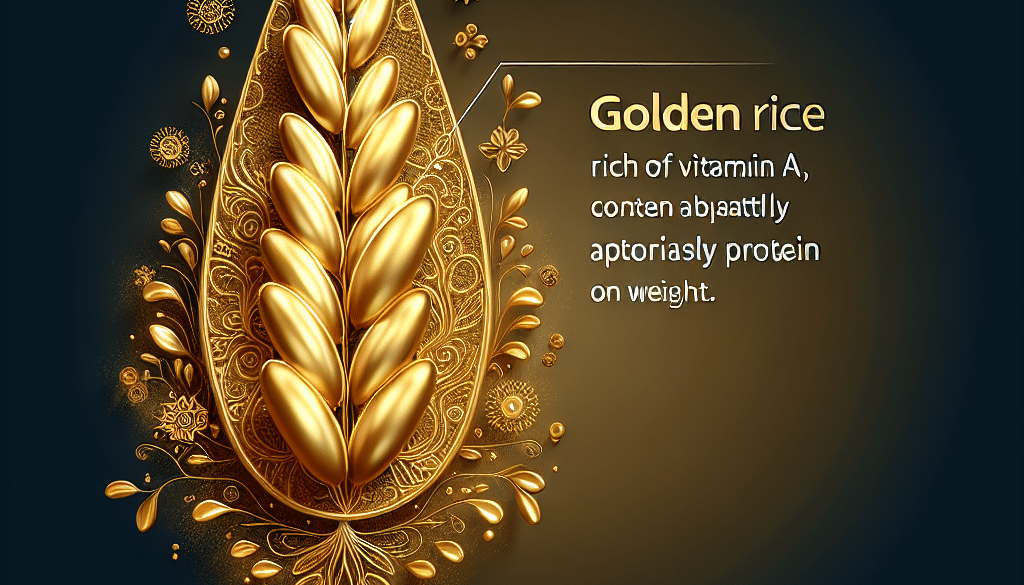How Much Protein Is In Golden Rice?
-
Table of Contents
- Golden Rice Protein Content: Nutritional Benefits and Implications
- Understanding Golden Rice: An Overview
- Protein in Rice: A General Perspective
- Protein Content in Golden Rice
- Comparative Analysis: Golden Rice vs. Conventional Rice
- Case Studies and Research Findings
- Global Implications of Golden Rice Consumption
- Challenges and Considerations
- Conclusion: The Role of Golden Rice in Global Nutrition
- Discover ETprotein’s High-Quality Protein Products
Golden Rice Protein Content: Nutritional Benefits and Implications

Golden Rice has been a topic of interest within the scientific community and among those concerned with nutrition, food security, and public health. This genetically modified crop was developed to combat vitamin A deficiency, a serious health issue in many developing countries. However, when discussing the nutritional value of Golden Rice, it’s essential to consider not only its vitamin content but also its protein levels, as protein is a crucial macronutrient for human health. In this article, we delve into the protein content of Golden Rice and its implications for global nutrition.
Understanding Golden Rice: An Overview
Golden Rice is a variety of rice (Oryza sativa) that has been genetically engineered to produce beta-carotene, a precursor to vitamin A. The modification involves the insertion of genes from daffodil (Narcissus pseudonarcissus) and a bacterium (Erwinia uredovora), enabling the rice to produce beta-carotene in the endosperm, which is the part of the rice grain consumed as food. The name “Golden Rice” comes from the golden color of its grains, which is due to the presence of beta-carotene.
Protein in Rice: A General Perspective
Rice is a staple food for over half of the world’s population, and while it is primarily a source of carbohydrates, it also provides protein. The protein content of rice can vary depending on the variety and cultivation conditions. Generally, rice protein is considered to be of high quality, containing all the essential amino acids, although it is typically lower in lysine.
Protein Content in Golden Rice
The primary focus of Golden Rice development has been to enhance its vitamin A content. However, it is also important to consider its protein content, especially in regions where rice is a major dietary component and protein malnutrition is a concern. Studies have shown that the protein content of Golden Rice is comparable to that of conventional rice varieties. On average, rice contains about 7-10% protein by dry weight, and Golden Rice falls within this range.
Comparative Analysis: Golden Rice vs. Conventional Rice
When comparing Golden Rice to conventional rice varieties, it’s crucial to look at not only the quantity of protein but also the quality. The amino acid composition of Golden Rice protein has been found to be similar to that of other rice varieties, which means it can contribute to a balanced diet when combined with other protein sources to compensate for its lower lysine content.
Case Studies and Research Findings
Several studies have been conducted to assess the nutritional value of Golden Rice. For instance, a study published in the Journal of Agricultural and Food Chemistry analyzed the protein content of Golden Rice and found it to be on par with that of its non-modified counterparts. Another study in the American Journal of Clinical Nutrition highlighted the potential of Golden Rice to provide up to 30% of the estimated average requirement for vitamin A in young children, emphasizing its role in addressing micronutrient deficiencies rather than protein malnutrition.
Global Implications of Golden Rice Consumption
The introduction of Golden Rice into the diets of populations at risk of vitamin A deficiency could have significant health benefits. However, it is also essential to consider the broader nutritional context. In regions where rice is a dietary staple, ensuring that Golden Rice can contribute to overall protein intake is important for comprehensive nutritional improvement.
Challenges and Considerations
While Golden Rice offers a promising solution to vitamin A deficiency, there are challenges to its widespread adoption. These include regulatory hurdles, public acceptance of genetically modified organisms (GMOs), and the need for further research to ensure that its cultivation and consumption do not have unintended consequences on local ecosystems or traditional rice varieties.
Conclusion: The Role of Golden Rice in Global Nutrition
In conclusion, Golden Rice contains a similar amount of protein as conventional rice varieties, making it a viable component of a protein-sufficient diet. Its primary benefit, however, lies in its potential to alleviate vitamin A deficiency in at-risk populations. As with any food source, it is important to consume Golden Rice as part of a diverse and balanced diet to meet all nutritional needs.
Discover ETprotein’s High-Quality Protein Products
If you’re looking for additional protein sources to complement your diet, consider exploring ETprotein’s range of organic and vegan protein products. ETprotein offers a variety of plant-based proteins, including organic rice protein, which can be an excellent addition to a healthy diet.
About ETprotein:
ETprotein, a reputable protein and L-(+)-Ergothioneine (EGT) Chinese factory manufacturer and supplier, is renowned for producing, stocking, exporting, and delivering the highest quality organic bulk vegan proteins and L-(+)-Ergothioneine. They include Organic rice protein, clear rice protein, pea protein, clear pea protein, watermelon seed protein, pumpkin seed protein, sunflower seed protein, mung bean protein, peanut protein, and L-(+)-Ergothioneine EGT Pharmaceutical grade, L-(+)-Ergothioneine EGT food grade, L-(+)-Ergothioneine EGT cosmetic grade, L-(+)-Ergothioneine EGT reference grade and L-(+)-Ergothioneine EGT standard. Their offerings, characterized by a neutral taste, non-GMO, allergen-free attributes, with L-(+)-Ergothioneine purity over 98%, 99%, cater to a diverse range of industries. They serve nutraceutical, pharmaceutical, cosmeceutical, veterinary, as well as food and beverage finished product distributors, traders, and manufacturers across Europe, USA, Canada, Australia, Thailand, Japan, Korea, Brazil, and Chile, among others.
ETprotein specialization includes exporting and delivering tailor-made protein powder and finished nutritional supplements. Their extensive product range covers sectors like Food and Beverage, Sports Nutrition, Weight Management, Dietary Supplements, Health and Wellness Products, and Infant Formula, ensuring comprehensive solutions to meet all your protein needs.
As a trusted company by leading global food and beverage brands and Fortune 500 companies, ETprotein reinforces China’s reputation in the global arena. For more information or to sample their products, please contact them and email sales(at)ETprotein.com today.












